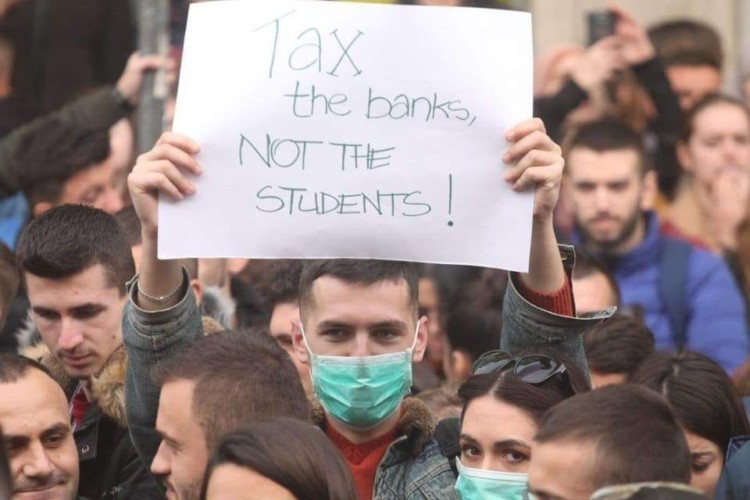Flori Kikia
In the past weeks Albania is in an unprecedented state of unrest. The cause for this is not a national-nationalist issue, but a students’ movement. This in an historic event for the country, as it is the first time that such a mass, combative and, up until now, adamant movement is appearing since the fall of the “Hoxha regime”. One of the reasons that the students took the streets was the decision made by universities and the ministry of education to impose a fine for every course that students fail to pass and that is re-examined in September.
This measure, which already applies in various private universities was the final straw. But the actual causes that led to this unexpected rise of the student movement can be clearly traced deeper. Albania is one of the countries that follow strictly the instructions of the Bologna Process and the Treaty of Lisbon, and all that goes with them. The university degrees are separated in two academic cycles, students pay tuitions, there are no free provisions, the University Councils are established, the student unions have long been abolished, universities are expected to be self-financed, faculty members are more powerful, and many other changes have been promoted. The ideological and material domination of neoliberalism is clear in every aspect of the student (and not only) life. One could say that the current situation in the universities (in the majority of the Balkan countries as well) is the dream of every government and a future nightmare for Greece.
The impact of these reforms is dramatic. Students face a terrible everyday life. They pay for the course books even if they are in electronic form, the pay for the dorm rooms even though they are in an awful state lacking heat and warm water, they pay for their boarding. Everyone has heard about faculty members that without bribe will not grant your course success. Even sexual scandals involving female students and faculty are not unheard of. On top of this, a couple of years ago the government voted a measure, according to which all the universities of the country, state or private, were all termed as “public” and started sharing the state funding! This scandalous reform aimed to assist the owners of the private universities, who in some cases are businessmen friendly to or related with MPs of the governing parties. All this is happening in a country where the salaries are depressingly low, health, insurance and the state of justice are disappointing, while organized crime and corruption are controlling everything. In this scenery, though, the first acts of resistance began to rise. In 2013, in the struggle against the university reform, the “Levizja per Universitatin/Movement for the University” came to light. Even though initially it was a small group of combatants, their enviable tenacity and unselfishness, their persistence to bring up the real issues gradually started to produce results. The mainly student youth started to be in touch with a new coalescent collective, which did not resemble at all the youths of the governing parties. The demonstrations that take place in Tirana are largely attributed to the continuous work being carried out by the combatants of the “Movement for the University”.
The formation of core groups in multiple departments, the preparation of the demonstrations week by week and their co-ordination led to the first mass appearance of the students’ movement. Regarding their demands, they used to be about the immediate withdrawal of the “exam failure fine” but they are now more diverse and comprise the “Eight Points”, which among else include: Raising the education expenditure up to 5% of the GDP targeting to the 50% decrease of the tuitions in every grade, the improvement of the provided education, the upgrade of the infrastructure and the student dorms, transparency in the budget and its distribution, increasing the importance of the student vote in the elections of the administrative positions from its current 10% to 50%, the distribution of free course books and the access to scientific literature, the provision of a student pass with all the commodities that come with it, etc. All the above, as they note, can only be accomplished by abolishing the law for the tertiary education. The students’ mobilizations are in a critical curve: Since the outbreak of the movement, the youths of the opposition parties (the Democratic Party and the Socialist Movement for Integration – Split of the Socialist Party) attempted, with the use of various means, to take control of the movement. Their effort so far has failed miserably. The government, from its standpoint, claims that it accepts, by principal, all eight demands of the students, but not the abolishment of the current law and summons the students to a discussion. The movement insists in the “no negotiations” policy. In the same time, the high school students have begun as well to unite with the students, while the social acceptance of the movement is huge. Undoubtedly, the student movement in Albania is in an infantile state, its structures are nonexistent, its politicization extremely low and there is no historical tradition from which they could draw inspiration (maybe though it’s for the best). Practically, this movement is required to… run before it learns how to walk. In a sense, though, it has already achieved major victories. It pointed the whole society towards a way to fight and demand. It demonstrated that no government can resist a combative, massive and uncompromising movement. It boosted the morale of the people.
Flori Kikia
Μπορείτε να διαβάσετε το άρθρο και στα Ελληνικά
Αλβανία: Φοιτητική εξέγερση κατά του μαφιόζικου νεοφιλευθερισμού


















